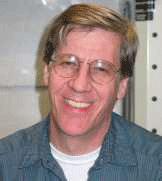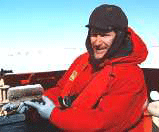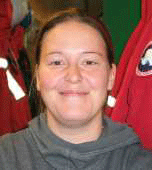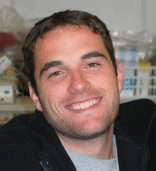Woods
Hole Oceanographic Institution -
|
|
|
Dr. Rebecca Gast My research has the overall theme of molecular protistan
ecology, |
|
|
Mark Dennett Institution with a primary focus in microbial ecology. I have been to the Antarctic several times before. In fact, I have been to sea on the N.B. Palmer more than any other ship. On previous trips to the Ross Sea I have been quantifying seasonal changes in the rates of herbivory and bacterivory by nano- and microplankton along with their abundance and distribution as part of the JGOFS/AESOPS program. On the Antarctic peninsula, I was part of 2 GLOBEC cruises studying the distribution of krill. On this cruise I will help with the processing of water and ice samples for molecular sequence identification of marine protists along with coordinating our over-the-side water and ice coring operations. |
|
|
Dawn Moran I am a research assistant in Dr. Rebecca Gast's molecular
protistan |
|
|
 |
Dr. Robert Sanders
I'm an ecologist who studies planktonic organisms in marine andfresh waters. My research emphasis is on protists (algae and protozoa) and invertebrates. Recent work has focused on the effects of ultraviolet radiation on ciliates and flagellates, the ecological role of mixotrophic phytoplankton that are both photosynthetic and bacterivorous, and the utilization of protozoa as food by zooplankton. On this research trip I will be working with colleagues to examine bacterivory and carnivory by protists and the ways that UV radiation affects growth and feeding of these single-celled organisms. This is my second trip to Antarctica with the Woods Hole / USC group. More information about my research, including some pictures from our last voyage to the Southern Ocean can be found at http://astro.temple.edu/~sanders1. University of Southern California - Los Angeles, CA |
|
|
 |
Dr. David Caron
Dave was unexpectedly not able to join this trip to the SouthernOcean, but we are sure he is here in spirit. His research interests are reflected by the projects of the USC group and the other projects described on this website. |
 |
Dr. Astrid Schnetzer Southern California. Much of my current focus is on combining traditional microscopy with a molecular approach (ribosomal DNA sequence) to investigate how crustaceans (copepods or shrimp) shape the community structure of protists (microalgae and protozoa). The goal is to create the link between genetic species identification and the ecological role that individual protistan species/groups play in marine food webs. Copepod predation can have a major effect on the community structure of protistan assemblages. On this cruise I hope to learn about protistan diversity in open water, slush and ice and to better understand how Ross Sea copepods make a living by preying on them. |
|
|
Hi! I’m a fourth year PhD student in Dave Caron’s
lab at the |
|
|
Rebecca Schaffner I am a technician in Dr. Dave Caron’s lab at USC.
On this cruise, I |
 |
Matt Travao of Southern California. My work there is mainly in the field of molecular biology. I work with the cloning and sequencing of microbial DNA for the purpose of identification. With this information I am able observe community structure and changes in microbial diversity over time. This is my objective for this cruise. We are on our way to collect water samples in the Ross Sea to observe what organisms live in different locations, and how a community in one location will change over time. |